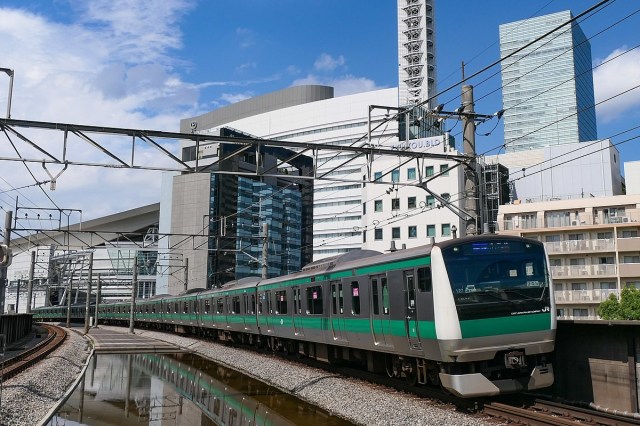
Tokyo station employee could have chosen better words.
Japan is very proud of its trains, and in many ways rightfully so. The country has one of the cleanest, most reliable, and most convenient rail networks to be found anywhere on the planet.
But it isn’t perfect, and the undeniably worst part of train travel in Japan is the possibility of encountering a chikan, or groper, onboard. Rail operators have tried various countermeasures to attempt to prevent gropings, but the actions of one East Japan Railway Company worker have been drawing criticism after a video taken at Shinjuku Station in downtown Tokyo on August 30 recently went viral.
The video shows a station worker on the platform of the Saikyo Line, which connects Tokyo with Saitama Prefecture, its neighbor to the north. Standing outside a northbound train that’s about to depart, the worker, holding a handheld microphone and speaking through the P.A. system, says:
“We have many security cameras installed, but there are many chikan. Passengers who do not want to be groped, please make use of the rear carriages.”
The message, and choice of words, has drawn a swift backlash online, with Twitter reactions such as:
“So should we just assume we’re going to be groped if we ride in the front cars? Instead of trying to change the victims, try to change the perpetrators.”
“Are they any women who don’t not want to be groped?”
“Companies and society should show the stance that ‘Groping is unforgivable.’”
“I want them to change this to an announcement where they strongly say that groping is a crime.”
“We don’t need to ask victims to defend themselves! What we need to do is to make sure gropers feel guilty.”
So why was the employee recommending that passengers “who don’t want to be groped” use the rear cars? In the evening rush hour, when the video was taken, the front cars on the northbound Saikyo Line tend to be the most crowded, since many stations on the line have exit stairways at the north end of the platform, making for the most convenient way for passengers to exit the station after getting off. Since chikan are most likely to strike on crowded cars, the recommendation to use the rear cars does have some statistical sense behind it.
As for calls to make chikan feel guilty by reminding them that groping is a crime, posters saying “Groping is illegal” are already common in Japanese train stations and haven’t done very much to stop the problem, and maybe it isn’t so shocking that anyone shameless enough to forcefully grope someone isn’t likely to have their behavior altered by an appeal to their decency. Deplorable and unfair to potential victims as the situation is, some commenters could understand the sentiment of choosing to offer actionable advice instead of an ineffective reassertion that groping is illegal. Others, though, had suggestions for different messages they felt should have been included in the announcement.
“There are a lot of things you could take issue with here, but I think it’s a good to see JR East making verbal announcements about chikan countermeasures.”
“’People who don’t want to be groped…’ isn’t a good way to put it, but I’m glad they’re making an announcement.”
“They should say ‘Groping is a crime, and chikan will be thrown in prison for the maximum sentence.”
“Change it to ‘If you are groped, or see a groper, inform the rail staff immediately.”
One thing just about everyone seems to agree on, though, is that there were better phrases to use than “people who don’t want to be groped,” and that a different choice of words would have avoided accusations of insensitivity stemming from the possible interpretation of “If you’re riding in the front cars, guess that means you don’t mind being groped.” In the video, the station worker making the announcement doesn’t seem particularly used to addressing a crowd, pausing and stuttering as he speaks, so giving the assignment to a more polished public speaker, and/or providing a better prepared statement to begin with, probably would have saved JR East some headaches. A spokesperson for the company has offered the following apology.
“The intent was to guide passengers towards less crowded carriages, but a portion of the announcement was inappropriate. We deeply apologize to those who were made uncomfortable by the announcement.”
JR’s statement makes it somewhat unclear as to whether the intended guidance towards less crowded cars was meant as a chikan countermeasure or simply for the purpose of greater overall passenger comfort. Either way, though, the fact that the announcement itself acknowledges the problem of chikan suggests that more could be done to address it, such as perhaps expanding the policy of women-only cars on the Saikyo Line (which currently are only available after 11 p.m.) to the earlier evening rush hour as well.
Source: FNN Prime Online via Hachima Kiko, JR East, Twitter
Top image: Wikipedia/MaedaAkihiko
● Want to hear about SoraNews24’s latest articles as soon as they’re published? Follow us on Facebook and Twitter!

 Japan Railways to release new anti-groper smartphone app to help victims before chikan gets away
Japan Railways to release new anti-groper smartphone app to help victims before chikan gets away Majority of Japanese women in poll support idea of men-only train cars
Majority of Japanese women in poll support idea of men-only train cars Social media users boast of plans to grope schoolgirls on day of Japan’s most important test
Social media users boast of plans to grope schoolgirls on day of Japan’s most important test Japanese company offers insurance plan to protect against false train groping accusations
Japanese company offers insurance plan to protect against false train groping accusations Japanese Internet sad to see the word “chikan” becoming commonly used in English
Japanese Internet sad to see the word “chikan” becoming commonly used in English McDonald’s new Happy Meals offer up cute and practical Sanrio lifestyle goods
McDonald’s new Happy Meals offer up cute and practical Sanrio lifestyle goods All-you-can-drink Starbucks and amazing views part of Tokyo’s new 170 meter-high sky lounge
All-you-can-drink Starbucks and amazing views part of Tokyo’s new 170 meter-high sky lounge Studio Ghibli glasses cases let anime characters keep an eye on your spectacles
Studio Ghibli glasses cases let anime characters keep an eye on your spectacles McDonald’s Japan releases a pancake pie for new retro kissaten coffeeshop series
McDonald’s Japan releases a pancake pie for new retro kissaten coffeeshop series The oldest tunnel in Japan is believed to be haunted, and strange things happen when we go there
The oldest tunnel in Japan is believed to be haunted, and strange things happen when we go there Awareness campaign warns foreigners in Japan of “Divorce without Consent”
Awareness campaign warns foreigners in Japan of “Divorce without Consent” We try out “Chan Ramen”, an underground type of ramen popular in the ramen community
We try out “Chan Ramen”, an underground type of ramen popular in the ramen community Starbucks reopens at Shibuya Scramble Crossing with new look and design concept
Starbucks reopens at Shibuya Scramble Crossing with new look and design concept More foreign tourists than ever before in history visited Japan last month
More foreign tourists than ever before in history visited Japan last month Super Nintendo World expansion gets delayed for several months at Universal Studios Japan
Super Nintendo World expansion gets delayed for several months at Universal Studios Japan Disney princesses get official manga makeovers for Manga Princess Cafe opening in Tokyo
Disney princesses get official manga makeovers for Manga Princess Cafe opening in Tokyo Beautiful new Final Fantasy T-shirt collection on the way from Uniqlo【Photos】
Beautiful new Final Fantasy T-shirt collection on the way from Uniqlo【Photos】 Is the new Shinkansen Train Desk ticket worth it?
Is the new Shinkansen Train Desk ticket worth it? Foreign English teachers in Japan pick their favorite Japanese-language phrases【Survey】
Foreign English teachers in Japan pick their favorite Japanese-language phrases【Survey】 Japanese convenience store packs a whole bento into an onigiri rice ball
Japanese convenience store packs a whole bento into an onigiri rice ball Studio Ghibli releases Kiki’s Delivery Service chocolate cake pouches in Japan
Studio Ghibli releases Kiki’s Delivery Service chocolate cake pouches in Japan Japan’s bone-breaking and record-breaking roller coaster is permanently shutting down
Japan’s bone-breaking and record-breaking roller coaster is permanently shutting down New definition of “Japanese whiskey” goes into effect to prevent fakes from fooling overseas buyers
New definition of “Japanese whiskey” goes into effect to prevent fakes from fooling overseas buyers Our Japanese reporter visits Costco in the U.S., finds super American and very Japanese things
Our Japanese reporter visits Costco in the U.S., finds super American and very Japanese things Studio Ghibli unveils Mother’s Day gift set that captures the love in My Neighbour Totoro
Studio Ghibli unveils Mother’s Day gift set that captures the love in My Neighbour Totoro Foreign passenger shoves conductor on one of the last full runs for Japan’s Thunderbird train
Foreign passenger shoves conductor on one of the last full runs for Japan’s Thunderbird train Domino’s Japan now sells…pizza ears?
Domino’s Japan now sells…pizza ears? New Japanese KitKat flavour stars Sanrio characters, including Hello Kitty
New Japanese KitKat flavour stars Sanrio characters, including Hello Kitty Kyoto creates new for-tourist buses to address overtourism with higher prices, faster rides
Kyoto creates new for-tourist buses to address overtourism with higher prices, faster rides Sales of Japan’s most convenient train ticket/shopping payment cards suspended indefinitely
Sales of Japan’s most convenient train ticket/shopping payment cards suspended indefinitely Sold-out Studio Ghibli desktop humidifiers are back so Totoro can help you through the dry season
Sold-out Studio Ghibli desktop humidifiers are back so Totoro can help you through the dry season Japanese government to make first change to romanization spelling rules since the 1950s
Japanese government to make first change to romanization spelling rules since the 1950s Ghibli founders Toshio Suzuki and Hayao Miyazaki contribute to Japanese whisky Totoro label design
Ghibli founders Toshio Suzuki and Hayao Miyazaki contribute to Japanese whisky Totoro label design Doraemon found buried at sea as scene from 1993 anime becomes real life【Photos】
Doraemon found buried at sea as scene from 1993 anime becomes real life【Photos】 Tokyo’s most famous Starbucks is closed
Tokyo’s most famous Starbucks is closed One Piece characters’ nationalities revealed, but fans have mixed opinions
One Piece characters’ nationalities revealed, but fans have mixed opinions We asked a Uniqlo employee what four things we should buy and their suggestions didn’t disappoint
We asked a Uniqlo employee what four things we should buy and their suggestions didn’t disappoint Princesses, fruits, and blacksmiths: Study reveals the 30 most unusual family names in Japan
Princesses, fruits, and blacksmiths: Study reveals the 30 most unusual family names in Japan One of Tokyo’s busiest subway lines is adding women-only cars
One of Tokyo’s busiest subway lines is adding women-only cars Anime-style art encourages young women to report Japanese train gropers in new posters
Anime-style art encourages young women to report Japanese train gropers in new posters Japanese bus driver chases down groper who targeted 18-year-old girl on his vehicle
Japanese bus driver chases down groper who targeted 18-year-old girl on his vehicle Japan’s anti-train groper badge design contest announces this year’s winners
Japan’s anti-train groper badge design contest announces this year’s winners A heartwarming tale of mistaken Japanese train groping
A heartwarming tale of mistaken Japanese train groping Japanese schoolgirl seeking crowdfunding, art submissions to produce anti-train groper pins
Japanese schoolgirl seeking crowdfunding, art submissions to produce anti-train groper pins “Men-only train car” to run in Tokyo as part of “Weak Men’s” association awareness campaign
“Men-only train car” to run in Tokyo as part of “Weak Men’s” association awareness campaign Plus-size Japanese model lets her anger fly in new-type anti-train groper posters
Plus-size Japanese model lets her anger fly in new-type anti-train groper posters Japanese security company claims it’s discovered a new kind of train pervert: Lady sniffers
Japanese security company claims it’s discovered a new kind of train pervert: Lady sniffers Majority of Japanese men in their 20s say they want men-only train cars in survey
Majority of Japanese men in their 20s say they want men-only train cars in survey New anti-chikan cellphone stickers let you mark train gropers with sign of shame
New anti-chikan cellphone stickers let you mark train gropers with sign of shame Tokyo Metro adds platform display showing where least crowded parts of the next train will be
Tokyo Metro adds platform display showing where least crowded parts of the next train will be These are the 11 most crowded trains in Japan…and surprise! They’re all in the Tokyo area
These are the 11 most crowded trains in Japan…and surprise! They’re all in the Tokyo area
Leave a Reply